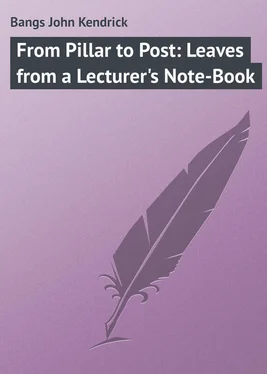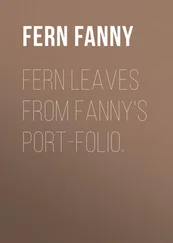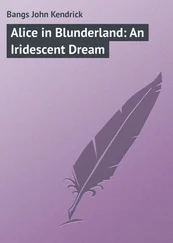John Bangs - From Pillar to Post - Leaves from a Lecturer's Note-Book
Здесь есть возможность читать онлайн «John Bangs - From Pillar to Post - Leaves from a Lecturer's Note-Book» — ознакомительный отрывок электронной книги совершенно бесплатно, а после прочтения отрывка купить полную версию. В некоторых случаях можно слушать аудио, скачать через торрент в формате fb2 и присутствует краткое содержание. Издательство: Иностранный паблик, Жанр: foreign_prose, на английском языке. Описание произведения, (предисловие) а так же отзывы посетителей доступны на портале библиотеки ЛибКат.
- Название:From Pillar to Post: Leaves from a Lecturer's Note-Book
- Автор:
- Издательство:Иностранный паблик
- Жанр:
- Год:неизвестен
- ISBN:нет данных
- Рейтинг книги:4 / 5. Голосов: 1
-
Избранное:Добавить в избранное
- Отзывы:
-
Ваша оценка:
- 80
- 1
- 2
- 3
- 4
- 5
From Pillar to Post: Leaves from a Lecturer's Note-Book: краткое содержание, описание и аннотация
Предлагаем к чтению аннотацию, описание, краткое содержание или предисловие (зависит от того, что написал сам автор книги «From Pillar to Post: Leaves from a Lecturer's Note-Book»). Если вы не нашли необходимую информацию о книге — напишите в комментариях, мы постараемся отыскать её.
From Pillar to Post: Leaves from a Lecturer's Note-Book — читать онлайн ознакомительный отрывок
Ниже представлен текст книги, разбитый по страницам. Система сохранения места последней прочитанной страницы, позволяет с удобством читать онлайн бесплатно книгу «From Pillar to Post: Leaves from a Lecturer's Note-Book», без необходимости каждый раз заново искать на чём Вы остановились. Поставьте закладку, и сможете в любой момент перейти на страницу, на которой закончили чтение.
Интервал:
Закладка:
No one would be so foolish as to deny, however, that audiences do vary materially in their capacity to take in the subtler points of a lecture "fired" at them from the platform. I should not think of using the same phrases in a talk before a gathering in an East Side settlement house in New York that I would use before the ladies of a Browning Club in the vicinity of Boston, or before a body of college professors, or vice versa. But if I were fortunate enough to be asked to address all three, I should endeavor to vary the wording of my discourse according to the several needs of each, and base my notion of my "best" upon the demands of those particular needs. I confess also that if in one single audience all three classes of listeners were represented, I should not hesitate to put my thought into the language required by the capacity of the East Siders to understand, and be fairly assured of pleasing everybody; for it is my observation of the ways of ladies addicted to Browning, and of gentlemen of the academic kind, that they are after all very human, and enjoy simplicity of discourse quite as much as the other sort.
There is greater sincerity in "playing to the gallery" than most of the critics of that habit dream of, and personally I would rather fall short of the expectations of the boxes than fail in the eyes of the gallery, where reticence in the expression of critical opinion is not exactly a conspicuous virtue. To put it more plainly, I should infinitely prefer the humiliation of seeing a highborn lady falling asleep in an orchestra chair because of the bromidic quality of my talk, than be reminded of the same by flying vegetable matter consigned to me by some dissatisfied individual sitting up among the "gods."
An amusing, if somewhat radical, contrast in audiences befell my lot several years ago in the brief space of sixteen hours. In that time I successively addressed the Harvard Union at Cambridge on a Tuesday evening, and the ladies of a Woman's Club in a Boston suburb the following morning. The audience at the Union was gathered in the wonderfully beautiful auditorium of Memorial Hall, and contained not less than twelve hundred particularly live wires, undergraduates mostly, almost fresh from the football field, or at least still under the influence of its system of expressing approval.
As I mounted the rostrum bedlam broke loose: not necessarily as a tribute to myself, but because frenzy is the modern collegiate way of making a visitor feel welcome. Thunderous noises never yet classified shook the rafters – noises ranging from the hoarse clamor of an excited populace at the finish of some great Olympian event, to the somewhat uncertain cackle of a freshman voice changing from soprano to bass. Pandemonium did not reign: it poured. Not since I visited the London Zoo and witnessed there a fight between two caged lions to the excited, clamorous interest of all the other beasts imprisoned there, have I heard such a variegated din as greeted me on that occasion, and I realized sympathetically for the first time perhaps the true significance of Theodore Roosevelt's "dee-lighted" smile when as President of the United States he took his annual stroll across the football field at a Harvard and Yale game, and listened to the "voice of the people." So contagious was it that I had all I could do to keep from joining in myself and only the necessity of saving my voice for my lecture prevented me from being myself heard above the din.
That noise was the keynote of the evening. I think I may say with due modesty that my lecture had one or two touches of humor in it – three or four, in fact – varying in character from the "scarcely perceptible subtle" to the "inevitably obvious," with other sorts sandwiched in between, and none of them was lost; although I was not permitted to finish many of my sentences. The audience seemed to get in ahead of me every time.
The situation reminded me in a way of the grandstand finish of a poor paralyzed old darky named Joe, of whom I was once told by a Pullman car porter on my way through Montana. Joe had been a famous sportsman in his day; but now misfortune had overtaken him, and he lay bedridden, wholly unable to use his legs, and awaiting the end. Several of his friends, taking pity on him, resolved to give him the joy of one last glorious coon hunt.
They put him on a stretcher and carried him out into the country where that luscious creature "abounded and abutted." The dogs were let loose, and finally showed unusual activity at the base of a tall tree; but, to the dismay of all, the game turned out to be no coon, but a particularly hungry, sore-headed, old she-bear.
As the roaring beast clambered down after her tormentors, Joe's litter bearers, terrified, dropped their burden and made off down the road in coward flight, and it was not until an hour after they had reached home in safety that they thought of the possible fate of their paralytic friend. Conscience-stricken, they resolved to go to Joe's home and break the news of their cowardly behavior to the presumable widow. The good woman met them at the door.
"What yo' niggahs want round here dis time o' night?" she demanded.
"We come to tell yo' 'bout Joe, Mis' Johnsing," said the embarrassed spokesman.
"Yo' kain't tell me nothin' 'bout Joe what Ah don' know a'ready," replied Mrs. Johnson coldly.
"Yas'm; but yo' don' know whar Joe is, Mis' Johnsing," persisted the speaker. "We done – "
"Yas, Ah do know whar Joe is," retorted the lady. "He's upstairs in he bed."
"In he bed?" echoed the astonished visitors.
"Yass," said Mrs. Johnson. "Joe come in ovah an hour ago hollerin' like a bullgine fohty yahds ahead o' de dawgs."
I think I may say without exaggeration that that Harvard Union audience even beat Joe's record; for they were twice "fohty yahds ahead o' de dawgs" all the way through, and as for "hollerin'" they were not so much like one single "bullgine" as like a whole roundhouse full of them, aided and abetted by a couple of boiler factories in full blast.
And then, only sixteen hours later, came the address at the Woman's Club ten miles out of Boston; the same lecture, in a quiet drawing room, before forty ladies who embroidered and crocheted while I talked, and here the point that had raised the roof and shaken the foundations of the Harvard Union was greeted by the tapping of a thimble against the wooden frame of an embroidery hoop !
I cannot say which of the two varieties of approval pleased me more; but I will say that no idea of talking "up" or "down" to my audience occurred to me on either occasion: it was rather a matter of "getting across."
One never can tell save by the "feel" of things in the hour of action how they are going to turn out. Only this last season I found myself, through a misapprehension of the character of my engagement, standing before an audience in a New England amusement park on a Sunday afternoon. I will say frankly that if I had known that I was to be a sideshow to a Ferris Wheel and a scenic railway, with pink lemonade on tap everywhere, and "all for ten cents," I should not have accepted the engagement. While I have admired them at a respectful distance, I have never envied the wild man of Borneo or the bearded lady their opportunities for personal enrichment; but on this occasion in some way or other I had gained an impression that my date had been arranged by, and was to be under the auspices of, a combination of church interests, designed to offset the evils of Sunday afternoon idleness in a manufacturing town. It was a misunderstanding, however, that I now rejoice in; for, amusement park or not, sideshow or main ring, I found it an enjoyable and educating experience.
I approached it in fear and trembling, especially when I noticed as I was awaiting my "turn" the vast quantities of chewing gum that were being sold to my audience by the inevitable boy with the basket. There is always something disconcerting to a public speaker in the constant, simultaneous, and automatic movement of other jaws than his own, and in the face of a collective jaw, made up of sixteen hundred lowers that chewed as one, I feared that mine, singly and alone, would find the odds against it overpowering. Strange to say, however, my real fear on this occasion was not on the score of my audience, but whether I should be able to acquit myself creditably before them. I have fondly hoped that my little talk contained a message, and as I observed these seekers after pleasure slowly gathering, and taking their places on tiers of pine benches under the kindly shade of a row of noble pines, it occurred to me that if there was any fruitful soil for my message anywhere it was in the hearts of just such people as sat before me – toilers, the humbler folk, the men and women whose lives had been too busy with bread-and-butter problems for the acquirement of culture, and whose sole opportunity for amusement, uplifting or otherwise, came on these very Sunday afternoons.
Читать дальшеИнтервал:
Закладка:
Похожие книги на «From Pillar to Post: Leaves from a Lecturer's Note-Book»
Представляем Вашему вниманию похожие книги на «From Pillar to Post: Leaves from a Lecturer's Note-Book» списком для выбора. Мы отобрали схожую по названию и смыслу литературу в надежде предоставить читателям больше вариантов отыскать новые, интересные, ещё непрочитанные произведения.
Обсуждение, отзывы о книге «From Pillar to Post: Leaves from a Lecturer's Note-Book» и просто собственные мнения читателей. Оставьте ваши комментарии, напишите, что Вы думаете о произведении, его смысле или главных героях. Укажите что конкретно понравилось, а что нет, и почему Вы так считаете.












